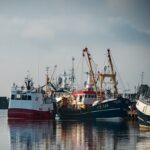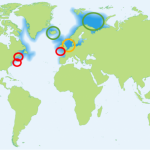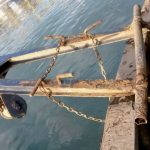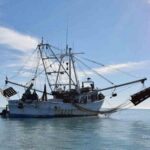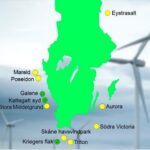Tag Archives: Pacific sardine
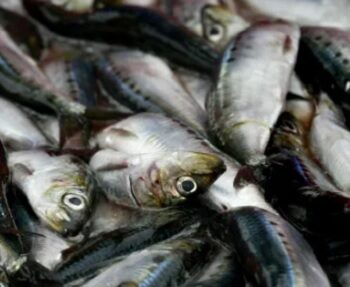
The sardine war hits a lull: Commercial fishing industry lands a victory in Pacific sardine management
The Pacific Fishery Management Council, which oversees fishing of Pacific sardines, voted unanimously in September to maintain the current sardine fishery management process that calls for reassessments after each year’s stock assessments. At the moment, the direct commercial sardine fishery is closed. “Fishery managers have failed to learn from the mistakes of history,” said Geoff Shester, senior scientist at marine conservation group Oceana,,, Diane Pleschner-Steele, executive director of the California Wetfish Producers Association, argues that sardines are not overfished and “the Council’s unanimous decision shows that they understand reality, the big picture.” >click to read< 14:27
Pacific sardine fishery closed for the third year in a row
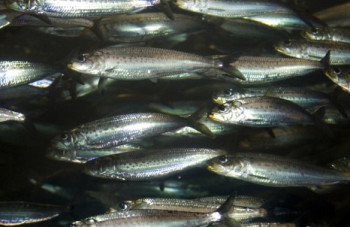 The Pacific Fishery Management Council on April 10 announced the continued closure of the Pacific sardine directed fishery through June 30, 2018. This is the third annual closure in a row for this fishery. Council members heard from scientists that the abundance forecast for the 2017-18 season, scheduled to start July 1, was significantly below the 150,000 metric ton threshold for a directed fishery. They also considered testimony from fishery participants and environmental groups before reaching a decision to close the directed fishery. click here to read the story 19:33
The Pacific Fishery Management Council on April 10 announced the continued closure of the Pacific sardine directed fishery through June 30, 2018. This is the third annual closure in a row for this fishery. Council members heard from scientists that the abundance forecast for the 2017-18 season, scheduled to start July 1, was significantly below the 150,000 metric ton threshold for a directed fishery. They also considered testimony from fishery participants and environmental groups before reaching a decision to close the directed fishery. click here to read the story 19:33
Pacific sardine population remains low, says National Marine Fisheries Service
 A study released Friday by the National Marine Fisheries Service puts the northern Pacific sardine population off the West Coast at perilously low levels for the third straight year. The findings, which will be reviewed next month by The Pacific Fishery Management Council, while disheartening for both environmentalists and fishermen, are also disputed by some in the fishing industry who question the method by which these forage fish are counted.,, But Diane Pleschner-Steele, who is the executive director of the California Wetfish Producers Association and represents the majority of boat fishermen and processors who harvest wetfish, said that there’s significant error in the way the sardines are counted and that current government surveys are not surveying adequately the fish that are in the near shore ocean. “Closing the sardine fishery basically closes everything for us, except for squid,” said Pleschner-Steele. “We are seriously considering applying for disaster relief.” read the article here 09:26:19
A study released Friday by the National Marine Fisheries Service puts the northern Pacific sardine population off the West Coast at perilously low levels for the third straight year. The findings, which will be reviewed next month by The Pacific Fishery Management Council, while disheartening for both environmentalists and fishermen, are also disputed by some in the fishing industry who question the method by which these forage fish are counted.,, But Diane Pleschner-Steele, who is the executive director of the California Wetfish Producers Association and represents the majority of boat fishermen and processors who harvest wetfish, said that there’s significant error in the way the sardines are counted and that current government surveys are not surveying adequately the fish that are in the near shore ocean. “Closing the sardine fishery basically closes everything for us, except for squid,” said Pleschner-Steele. “We are seriously considering applying for disaster relief.” read the article here 09:26:19
Are big ups and downs normal for forage fish?
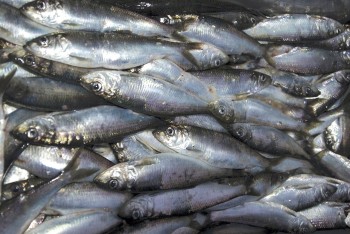 Forage fish stocks have undergone fluctuation swings for hundreds of years, research shows, with at least three species off the US West Coast repeatedly experiencing steep population increases followed by declines long before commercial fishing began. The rise and fall of Pacific sardine, northern anchovy, and Pacific hake off California have been so common that the species were in collapsed condition 29 to 40 percent of the time over the 500-year period from CE 1000 to 1500, according to a new study in Geophysical Research Letters. Using a long time series of fish scales deposited in low-oxygen, offshore sedimentary environments off Southern California, researchers described such collapses as “an intrinsic property of some forage fish populations that should be expected, just as droughts are expected in an arid climate.” Continue reading the article here 07:55
Forage fish stocks have undergone fluctuation swings for hundreds of years, research shows, with at least three species off the US West Coast repeatedly experiencing steep population increases followed by declines long before commercial fishing began. The rise and fall of Pacific sardine, northern anchovy, and Pacific hake off California have been so common that the species were in collapsed condition 29 to 40 percent of the time over the 500-year period from CE 1000 to 1500, according to a new study in Geophysical Research Letters. Using a long time series of fish scales deposited in low-oxygen, offshore sedimentary environments off Southern California, researchers described such collapses as “an intrinsic property of some forage fish populations that should be expected, just as droughts are expected in an arid climate.” Continue reading the article here 07:55
As Pacific sardine collapse worsens, scientists worry about possible ripple in the ecosystem
 Nearly a year into a West Coast sardine fishing ban enacted to protect the collapsing population, the fish formerly worth more than $8 million to Oregon’s economy have shown no signs of a comeback. New federal research indicates numbers of the small, silvery, schooling fish have plummeted further than before the fishing moratorium, dashing any hope of lifting it in 2016. With the current sardine population hovering at 7 percent of its 2007 peak, fishermen now say they expect to wait a decade or more to revive the fishery. “I don’t want to take a pessimistic view, but I would think we’ll be shut down until 2030,” said Ryan Kapp, a Bellingham, Washington, fisherman who advises the Pacific Fishery Management Council on sardines and other fish. Read the article here 15:33
Nearly a year into a West Coast sardine fishing ban enacted to protect the collapsing population, the fish formerly worth more than $8 million to Oregon’s economy have shown no signs of a comeback. New federal research indicates numbers of the small, silvery, schooling fish have plummeted further than before the fishing moratorium, dashing any hope of lifting it in 2016. With the current sardine population hovering at 7 percent of its 2007 peak, fishermen now say they expect to wait a decade or more to revive the fishery. “I don’t want to take a pessimistic view, but I would think we’ll be shut down until 2030,” said Ryan Kapp, a Bellingham, Washington, fisherman who advises the Pacific Fishery Management Council on sardines and other fish. Read the article here 15:33
What’s eating at Dr. Ray Hilborn today?!! Dr. Geoff Shester from Oceana
 Last week Dr. Geoff Shester, California campaign director for the nonprofit advocacy group Oceana criticized the Pacific Fishery Management Council for the persistence of low numbers of California Sardines. The lack of a population recovery may cause the commercial moratorium to last until 2017. The author explained this sardine population decline as being 93 percent less than it was in 2007. Dr. Shester does not believe this is because of environmental causes like climate change, El Nino, or natural fluctuations in forage fish species however – instead he blames the management body. “They warned of a population collapse and the fishery management body basically turned a blind eye and continued moving forward with business as usual.” Response Comment by Ray Hilborn, University of Washington, Read the rest here 11:49
Last week Dr. Geoff Shester, California campaign director for the nonprofit advocacy group Oceana criticized the Pacific Fishery Management Council for the persistence of low numbers of California Sardines. The lack of a population recovery may cause the commercial moratorium to last until 2017. The author explained this sardine population decline as being 93 percent less than it was in 2007. Dr. Shester does not believe this is because of environmental causes like climate change, El Nino, or natural fluctuations in forage fish species however – instead he blames the management body. “They warned of a population collapse and the fishery management body basically turned a blind eye and continued moving forward with business as usual.” Response Comment by Ray Hilborn, University of Washington, Read the rest here 11:49
West Coast sardine populations, long sinking, look even worse in forecast
 Sardines off the West Coast have continued on a steep decline, with populations this summer forecast to be down 93 percent from a 2007 peak, according to a draft assessment from the National Marine Fisheries Service. The sardines are a key forage food for sea lions, salmon and many other species, as well as a source of income for commercial fishermen. Last year, the sardine implosion was so severe that the Pacific Fishery Management Council voted to call off the season that was scheduled to start in July for West Coast fleets, including those in Washington state. Oceana shrew Geoff Shester throws his dogma into the conversation. Read the rest here 13:33
Sardines off the West Coast have continued on a steep decline, with populations this summer forecast to be down 93 percent from a 2007 peak, according to a draft assessment from the National Marine Fisheries Service. The sardines are a key forage food for sea lions, salmon and many other species, as well as a source of income for commercial fishermen. Last year, the sardine implosion was so severe that the Pacific Fishery Management Council voted to call off the season that was scheduled to start in July for West Coast fleets, including those in Washington state. Oceana shrew Geoff Shester throws his dogma into the conversation. Read the rest here 13:33
West Coast sardine decline: Science vs. politics, By D.B. Pleschner
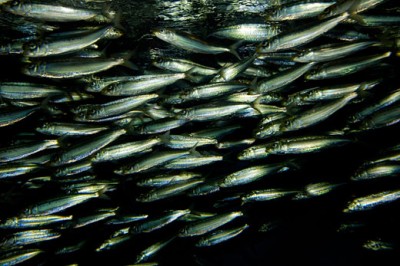 The federal Pacific Fishery Management Council has shut down the remainder of the current sardine season and has canceled the 2015-16 fishing season altogether. Fishermen supported this action. Why the closure? According to environmental groups like Oceana, it was to stop overfishing and save starving sea lions deprived of essential sardines. Neither reason is true, but many in the media have trumpeted this hyperbole put forth by groups whose political agenda is to shut down fishing completely. Read the rest here 08:40
The federal Pacific Fishery Management Council has shut down the remainder of the current sardine season and has canceled the 2015-16 fishing season altogether. Fishermen supported this action. Why the closure? According to environmental groups like Oceana, it was to stop overfishing and save starving sea lions deprived of essential sardines. Neither reason is true, but many in the media have trumpeted this hyperbole put forth by groups whose political agenda is to shut down fishing completely. Read the rest here 08:40
Plunging sardine numbers and a Pew Study spark quick management response?
 Fisheries managers have shut down this summer’s West Coast commercial sardine fishing season that begins in July, and this Tuesday, April 14, were considering an emergency shut down of the current season which doesn’t end until June 30. Then on April 13, the council announced that new information called into question whether the current season should also be shut down immediately. The study, funded by Pew Charitable Trusts,,, Read the rest here 19:23
Fisheries managers have shut down this summer’s West Coast commercial sardine fishing season that begins in July, and this Tuesday, April 14, were considering an emergency shut down of the current season which doesn’t end until June 30. Then on April 13, the council announced that new information called into question whether the current season should also be shut down immediately. The study, funded by Pew Charitable Trusts,,, Read the rest here 19:23
Valuable west coast fishery to close July 1
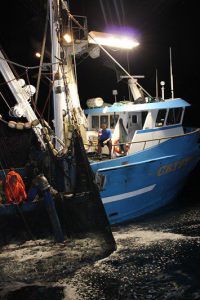 Poor recruitment, thought to be the result of unfavorable ocean conditions, has resulted in a perilous drop in the Pacific sardine of the Pacific sardine off the U.S. West Coast. Just to note, contrary to recent claims and reports – the Council’s Scientific and Statistical Committee states the fishery is NOT overfished nor is it subject to overfishing. Read the rest here 10:39
Poor recruitment, thought to be the result of unfavorable ocean conditions, has resulted in a perilous drop in the Pacific sardine of the Pacific sardine off the U.S. West Coast. Just to note, contrary to recent claims and reports – the Council’s Scientific and Statistical Committee states the fishery is NOT overfished nor is it subject to overfishing. Read the rest here 10:39
Oceana’s Geoffrey Shester says NOAA fails to connect the dots to Sardine overfishing, pushing the stock over the edge
 History repeats as the Pacific sardine population collapses and California’s iconic ocean wildlife feels the impacts. The Pacific sardine population has collapsed 90 percent since 2007 and the fishery has been overfishing during this decline. As a result, (overpopulated) sea lions and seabirds are starving and one of California’s most lucrative fisheries must soon shut down. Read the rest here 08:02
History repeats as the Pacific sardine population collapses and California’s iconic ocean wildlife feels the impacts. The Pacific sardine population has collapsed 90 percent since 2007 and the fishery has been overfishing during this decline. As a result, (overpopulated) sea lions and seabirds are starving and one of California’s most lucrative fisheries must soon shut down. Read the rest here 08:02
Pacific sardine industry shutdown looms as species collapses – Council Action Expected Sunday
 Pacific coast sardines are facing a population collapse so severe that Oregon’s multimillion-dollar sardine industry almost certainly will be shut down this summer. The Pacific Fishery Management Council, which regulates the fishing industry off the coast of Oregon, California and Washington, is expected to vote Sunday to close the West Coast sardine fishery in response to new population estimates that indicate the species’ still hasn’t emerged from an eight-year plummet. Read the rest here, and read the comments. Amazing 19:21
Pacific coast sardines are facing a population collapse so severe that Oregon’s multimillion-dollar sardine industry almost certainly will be shut down this summer. The Pacific Fishery Management Council, which regulates the fishing industry off the coast of Oregon, California and Washington, is expected to vote Sunday to close the West Coast sardine fishery in response to new population estimates that indicate the species’ still hasn’t emerged from an eight-year plummet. Read the rest here, and read the comments. Amazing 19:21
D.B. Pleschner: Sardines are not being overfished
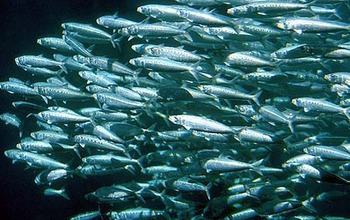 In recent weeks, sardines have been a hot news topic again. Environmental groups like Oceana complain that the sardine population is collapsing just like it did in the mid-1940s. They blame “overfishing” as the reason and maintain that the fishery should be shut down completely. Today, in truth, Pacific sardines are perhaps the best-managed fishery in the world — the poster fish for effective ecosystem-based management,,, Read the rest here 08:50
In recent weeks, sardines have been a hot news topic again. Environmental groups like Oceana complain that the sardine population is collapsing just like it did in the mid-1940s. They blame “overfishing” as the reason and maintain that the fishery should be shut down completely. Today, in truth, Pacific sardines are perhaps the best-managed fishery in the world — the poster fish for effective ecosystem-based management,,, Read the rest here 08:50
Con Group Oceana wants West Coast Sardine Fishing shut down immediately!
 West Coast fisheries managers will likely shut down sardine fishing this year in the face of evidence that the stock is declining. The commercial fishing fleet hopes that the Pacific Fishery Management Council will not be so concerned that they shut down other fisheries, such as mackerel and anchovies. However, the conservation group Oceana wants an immediate shut down. The group says this would leave food in the ocean for sea lions and other wildlife and speed the rebuilding process for sardines. Read the rest here 13:43
West Coast fisheries managers will likely shut down sardine fishing this year in the face of evidence that the stock is declining. The commercial fishing fleet hopes that the Pacific Fishery Management Council will not be so concerned that they shut down other fisheries, such as mackerel and anchovies. However, the conservation group Oceana wants an immediate shut down. The group says this would leave food in the ocean for sea lions and other wildlife and speed the rebuilding process for sardines. Read the rest here 13:43
Depletion? or Migration. Sardine disappearance was foreseen but ignored
 Pacific sardine populations fluctuate with water temperature. Colder water means fewer fish. Temperatures last fell in the 1940s, but heavy fishing continued, devastating the stock and ending fishing until sardines returned when waters warmed in the 1980s. more@newscientist 18:51 (Am I missing something? ) scratches head.
Pacific sardine populations fluctuate with water temperature. Colder water means fewer fish. Temperatures last fell in the 1940s, but heavy fishing continued, devastating the stock and ending fishing until sardines returned when waters warmed in the 1980s. more@newscientist 18:51 (Am I missing something? ) scratches head.

































